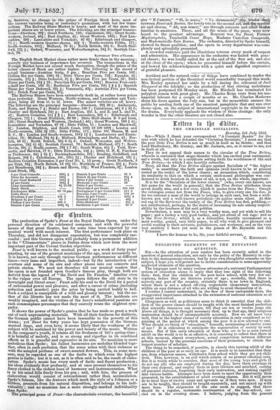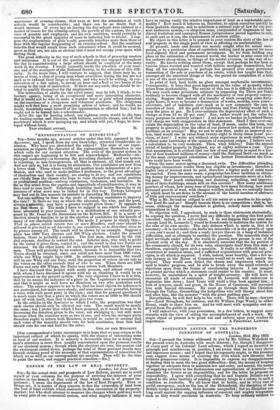NEGLECTED ELEMENTS OF THE EDUCATION QUESTION.
SIR—As the attention of your readers has been recently called to the question of general education, not only by the policy of the Ministry in rela- tion to the management-clauses, but by your own thoughtful remarks on the subject, I hope you will permit me to invite consideration to some apparently neglected elements of the question. The language used by many zealous advocates of a universal Parliamentary system of education seems to imply that they lose sight of the following facts: first, that the children of the poor leave school, with very few ex- ceptions, before they are thirteen years of age ; secondly, that there is scarcely any part of the country, certainly there is no town in England, where there is not a school offering respectable elementary instruction, within an easy distance of all who are willing to avail themselves of it.
I confess I cannot understand, in the face of these undeniable facts, the exaggerated importance attached to the extension of national education as at present understood.
Clergymen as well as politicians seem to think it essential that the chil- dren of the poorer classes should be taught with the most finished perfection that scientific resources can secure, till they are ten or twelve years old. Above all things, it is thought necessary that, up to that age, their religious instruction should be of unimpeachable accuracy. Now we all know very well, that in the higher classes of society education is only considered as be- ginning at the period at which among the poor it is now allowed to end. What should we think of "education," forsooth, terminating at twelve years of age ? It is ridiculous to anticipate the regeneration of society by such means. But if this early education of those who are to be so soon turned adrift on the world is to be so effective, it is consoling to reflect that there is at this moment, almost everywhere, actual competition between different schools, backed by the personal exertions of their promoters, to obtain the largest number of scholars. The thing to be remedied, if possible, is clearly this turning adrift of the children of the poor at so early an age. It is much to be lamented that they are, from whatever causes, withdrawn from school while they are yet chil- dren. This, however, is an evil which admits of no present effectual cure. But it is worth while to consider, that most of the young boys and girls (I do not say all) who are employed during the day, have their evenings at their own disposal, and employ them in mere idleness and mischief, casting off parental restraint, forgetting their early instruction, and sinking rapidly into vicious habits. Attempts have been made to meet the opportunity thus presented, by the establishment of adult evening classes. But it will never do to treat boys of twelve years and upwards as if they were men. If men are to be taught, they should be taught separately, and not mixed up with mere boys. The exigencies of the case seem to suggest, that there should be a regular, systematic continuation of the day-school, car- ried on in the evening alone. I believe, judging from the present
experience of evening-classes, that even at first the attendance at such schools would be considerable ; and there can be no doubt that it would increase. If every boy on leaving the day-schools were claimed as a matter of course for the evening-school, the growth of the custom, the influ-, ence of parents and employers, and his own ambition, would probably be successful in the great majority of cases in inducing him to attend. I sup- pose the employments of girls would generally interfere more than those of boys with the regular frequenting of an evening-school. But the combined benefits that would result from such attendance when it could be secured, great as they are, are also so obvious that I need not occupy your space with stating them. The great difficulty in the way of such schools is that of procuring masters
and mistresses. It is out of the question that any one engaged throughout the day in superintending a large school should be employed at the same work in the evening. I would earnestly invite the attention of your read- ers, and of the managers of the National Society, to the solution of this diffi- culty. In the mean time, I will venture to suggest, that there may be, in towns at least, a class of young men whose avocations during the day are not such as to exhaust their lungs or throat, and who would be willing, in con- sideration of a fair salary, to devote an hour and a half or two hours of the evening to the task of instruction. If there are any such, they should be in- vited to qualify themselves for the employment.
The instruction of adults (in the strict sense) may be left, I think, to vo-
luntary agency, being of an exceptional and more interesting character. But it would not be wise to make a regular boys' or girls' school dependent on the exertions of a clergyman and volunteer assistants. The clergyman might well find here a most promising sphere of labour, and he would, no doubt, thankfully avail himself of the opportunities so afforded him; but he ought not to be turned into a schoolmaster.
After the age for leaving school, say eighteen years, would be the time for reading-rooms and libraries, with lectures, scientific classes, and all that machinery which is now springing up, and which will yet, I hope, be deve- loped without limit.



























 Previous page
Previous page